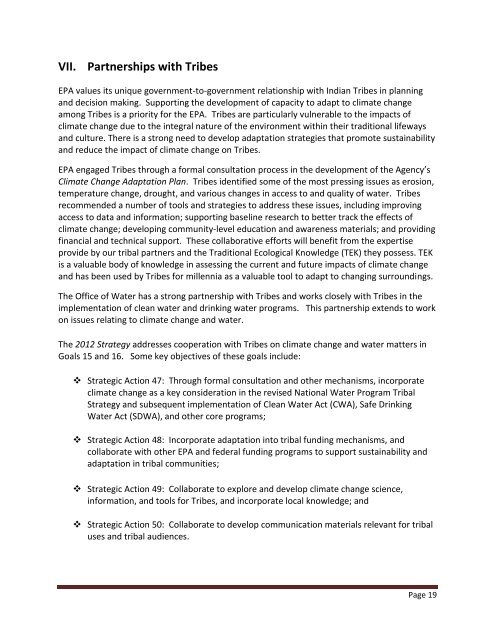OW-climate-change-adaptation-plan
OW-climate-change-adaptation-plan
OW-climate-change-adaptation-plan
You also want an ePaper? Increase the reach of your titles
YUMPU automatically turns print PDFs into web optimized ePapers that Google loves.
VII. Partnerships with Tribes<br />
EPA values its unique government-to-government relationship with Indian Tribes in <strong>plan</strong>ning<br />
and decision making. Supporting the development of capacity to adapt to <strong>climate</strong> <strong>change</strong><br />
among Tribes is a priority for the EPA. Tribes are particularly vulnerable to the impacts of<br />
<strong>climate</strong> <strong>change</strong> due to the integral nature of the environment within their traditional lifeways<br />
and culture. There is a strong need to develop <strong>adaptation</strong> strategies that promote sustainability<br />
and reduce the impact of <strong>climate</strong> <strong>change</strong> on Tribes.<br />
EPA engaged Tribes through a formal consultation process in the development of the Agency’s<br />
Climate Change Adaptation Plan. Tribes identified some of the most pressing issues as erosion,<br />
temperature <strong>change</strong>, drought, and various <strong>change</strong>s in access to and quality of water. Tribes<br />
recommended a number of tools and strategies to address these issues, including improving<br />
access to data and information; supporting baseline research to better track the effects of<br />
<strong>climate</strong> <strong>change</strong>; developing community-level education and awareness materials; and providing<br />
financial and technical support. These collaborative efforts will benefit from the expertise<br />
provide by our tribal partners and the Traditional Ecological Knowledge (TEK) they possess. TEK<br />
is a valuable body of knowledge in assessing the current and future impacts of <strong>climate</strong> <strong>change</strong><br />
and has been used by Tribes for millennia as a valuable tool to adapt to changing surroundings.<br />
The Office of Water has a strong partnership with Tribes and works closely with Tribes in the<br />
implementation of clean water and drinking water programs. This partnership extends to work<br />
on issues relating to <strong>climate</strong> <strong>change</strong> and water.<br />
The 2012 Strategy addresses cooperation with Tribes on <strong>climate</strong> <strong>change</strong> and water matters in<br />
Goals 15 and 16. Some key objectives of these goals include:<br />
Strategic Action 47: Through formal consultation and other mechanisms, incorporate<br />
<strong>climate</strong> <strong>change</strong> as a key consideration in the revised National Water Program Tribal<br />
Strategy and subsequent implementation of Clean Water Act (CWA), Safe Drinking<br />
Water Act (SDWA), and other core programs;<br />
Strategic Action 48: Incorporate <strong>adaptation</strong> into tribal funding mechanisms, and<br />
collaborate with other EPA and federal funding programs to support sustainability and<br />
<strong>adaptation</strong> in tribal communities;<br />
Strategic Action 49: Collaborate to explore and develop <strong>climate</strong> <strong>change</strong> science,<br />
information, and tools for Tribes, and incorporate local knowledge; and<br />
Strategic Action 50: Collaborate to develop communication materials relevant for tribal<br />
uses and tribal audiences.<br />
Page 19


